Heaven and The Hellish Brew
It finally arrives. The waiter gingerly slides the mug onto the table and smilingly announces, "your Café Mocha sir!" As I raise the mug to my lips, the wafting aroma of roasted bean, filtered by the froth hits me. I close my eyes, take a sip, swirl it around and swallow. The brew warms up my belly like a glow sign. I slowly open my eyes and look around in total wonder. The walls of the café have melted into a lush green background of rolling hills. Axl Rose’s throaty wail on the Guns and Roses track has merged into a louder, frenetic chorus of wailing, rising and falling like waves. And all around me, dancing with arms flaying, with flowing beards and beads are hundreds of men, in black robes swishing around in slow motion like sailing ships.
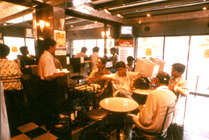 Suddenly, the wailing and dancing stops and everyone crumbles to the ground in a black heap. Rising up from the front is the chief, both hands clasping a brass urn as he pours out a dark-coloured broth into small bowls held out by the men. The bowls are raised to lips and passed around in silence. I am offered one too, by a man with eyes that have a strange shine, and as I slowly bend to sip, I close my eyes. The wailing starts again. When I open my eyes the familiar surroundings of the café are back. The loud thumping music, the chatter of the gals and guys and the non-stop aroma of roasted coffee.
Suddenly, the wailing and dancing stops and everyone crumbles to the ground in a black heap. Rising up from the front is the chief, both hands clasping a brass urn as he pours out a dark-coloured broth into small bowls held out by the men. The bowls are raised to lips and passed around in silence. I am offered one too, by a man with eyes that have a strange shine, and as I slowly bend to sip, I close my eyes. The wailing starts again. When I open my eyes the familiar surroundings of the café are back. The loud thumping music, the chatter of the gals and guys and the non-stop aroma of roasted coffee.
What I had just witnessed in a sense of déjà vu was an all night prayer session of Sufi Saints, at Mocha in Yemen, circa 13th century and the broth being passed around was coffee. 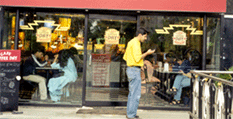 Arab traders brought the first beans into Yemen, from Ethiopia, where coffee was discovered by shepherds, who noticed that the sheep stayed awake after chomping on the red berries. For the Sufi Saints, desperately in search for something to keep the devout awake, the dark colored bean was heavensent. It calmed nerves, drove away sleep and replenished much needed energy. The habit of coffee drinking then trickled down from the Arab clergy to the masses, which called the drink ‘Quahwa’, literally meaning that which prevents sleep. The Arabs then took to cultivating it on a massive scale. Coffee production and trade became a lucrative business and the Arabs held on to the monopoly, even prohibiting carrying the plant out of Moslem shores.
Arab traders brought the first beans into Yemen, from Ethiopia, where coffee was discovered by shepherds, who noticed that the sheep stayed awake after chomping on the red berries. For the Sufi Saints, desperately in search for something to keep the devout awake, the dark colored bean was heavensent. It calmed nerves, drove away sleep and replenished much needed energy. The habit of coffee drinking then trickled down from the Arab clergy to the masses, which called the drink ‘Quahwa’, literally meaning that which prevents sleep. The Arabs then took to cultivating it on a massive scale. Coffee production and trade became a lucrative business and the Arabs held on to the monopoly, even prohibiting carrying the plant out of Moslem shores.
Then in 1610,Baba Budan, an Indian Muslim pilgrim to Mecca, smuggled the coffee plant out of Arabia and planted it on the hill slopes of Karnataka, where it is said that the offspring of the mother plant survive till today.
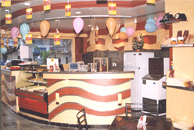 So Karnataka has historically been India’s coffee state and Bangalore its coffee capital. Strangely, coffee as a drink is popular only in the Southern States. Commonly and cheaply available as filter coffee in the numerous small ‘darshini’cafes and as an expensive beverage at the fancy 5-star hotel coffee shops. The average Indian coffee lover was middle-aged or older and the brew was religiously made in middle class homes, twice a day. The morning newspaper dose and the evening ‘tea-time’ special. Additional sessions were when visitors dropped in. Through the years domestic coffee consumption has hovered at 50,000 tons. But with the arrival of the Coffee Café or Pub, a new generation of drinkers has taken to coffee.
So Karnataka has historically been India’s coffee state and Bangalore its coffee capital. Strangely, coffee as a drink is popular only in the Southern States. Commonly and cheaply available as filter coffee in the numerous small ‘darshini’cafes and as an expensive beverage at the fancy 5-star hotel coffee shops. The average Indian coffee lover was middle-aged or older and the brew was religiously made in middle class homes, twice a day. The morning newspaper dose and the evening ‘tea-time’ special. Additional sessions were when visitors dropped in. Through the years domestic coffee consumption has hovered at 50,000 tons. But with the arrival of the Coffee Café or Pub, a new generation of drinkers has taken to coffee.
The Youth with swanky interiors, loud popular recorded music and a menu that boasts over a dozen varieties of hot and cold coffee, these new Cafes are the ideal place to hang out and chill . And if you can’t grab a seat during peak hours, there’s always the option of carrying away your favourite concoction in a plastic cup, designed for sipping your cuppa while cruising around eyeing the crowds.
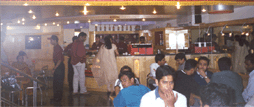 The prices are attractive too, ranging from Rs.8 to Rs.25. The computers provided in some outlets for surfing the Web ideally make these ‘Internet Cafes’ in the truest sense. They also have offers where you could ‘sip and browse’, where a little extra payment for your coffee entitles you to surf the web or vice versa. If your cappuchino doesn’t send your blood racing, the browsing experience will, provided the bandwidth allows.
The prices are attractive too, ranging from Rs.8 to Rs.25. The computers provided in some outlets for surfing the Web ideally make these ‘Internet Cafes’ in the truest sense. They also have offers where you could ‘sip and browse’, where a little extra payment for your coffee entitles you to surf the web or vice versa. If your cappuchino doesn’t send your blood racing, the browsing experience will, provided the bandwidth allows.
With newer Cafes being added in most of the bigger residential localities, the café owners hope to rope in the family segment."The café is an ideal place to meet up with your relatives and friends and chat up over a hot cup of the various items on offer. Also you can’t make any of our coffees at home without the specialised equipment", says R.Murali, Director of Café Coffee Day, the pioneer in this field in India with over 14 cafes in Bangalore, Chennai and Hyderabad.
The advent of these cafes does not seem to have effected the serious coffee and chat aficionados who throng the portals of Indian Coffee House on Mahatma Gandhi Road.
Though the earlier wooden furniture have given way to plastic, the costumes of the waiters, the ads for Indian Coffee that adorn the walls and the taste of filter coffee remain the same over the years. The look of the revolutionary and the bohemian has also changed along with the topics of debate. The spark of revolution is prevalent in huddled conversations, but more on Information Technology than on Communism or Socialism. Khakis, clean shaves and Reeboks have replaced the beards and the Kolhapuri Chappals. The potpourri of customers include middle-aged balding journalists from the nearby Deccan and Times offices, the odd software engineer with his dog tag around his neck (Just another code writer in the big, bad world of byte), portly housewives taking a break between shopping and lots of senior citizens with far away looks in their eyes. The thick aroma of roasting coffee fights for precedence over swirls of cigarette smoke. One bunch of people definitely missing in the Indian Coffee House are the youth. They have left for the brave new world of the Café. For Cappuchinos and Mochas.
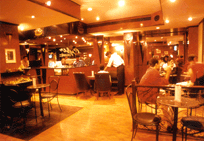 For Axl Rose and the Internet. The hellish black brew that kept a bunch of Sufi saints wide awake somewhere on a hill near Mocha seven centuries ago is keeping Bangalore’s youth addicted and coming back for more. Our sincere gratitude to Pope Clement VIII, (one among the long list of coffee supporters through the ages, who when requested to ban the drink, baptised it instead, declaring) " Why, this Satan’s drink is so delicious that it would be a pity to let the infidels have the full use of it." Ages after the Pope baptised it, the Sufis who swore by it and not to forget the Cappuchin monks after whose colour of robes the famed Cappucchino is named, Coffee, the hellish brew, even today retains a touch of heaven.
For Axl Rose and the Internet. The hellish black brew that kept a bunch of Sufi saints wide awake somewhere on a hill near Mocha seven centuries ago is keeping Bangalore’s youth addicted and coming back for more. Our sincere gratitude to Pope Clement VIII, (one among the long list of coffee supporters through the ages, who when requested to ban the drink, baptised it instead, declaring) " Why, this Satan’s drink is so delicious that it would be a pity to let the infidels have the full use of it." Ages after the Pope baptised it, the Sufis who swore by it and not to forget the Cappuchin monks after whose colour of robes the famed Cappucchino is named, Coffee, the hellish brew, even today retains a touch of heaven.
By Monu Surendran
